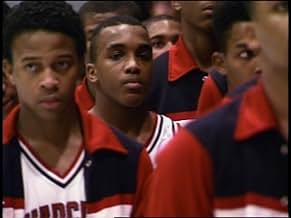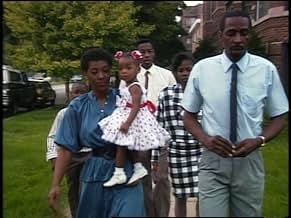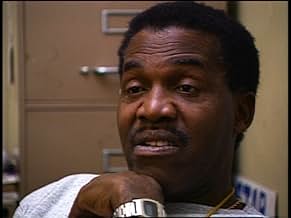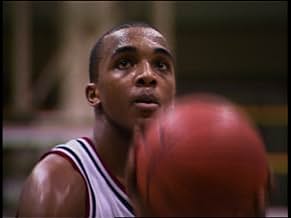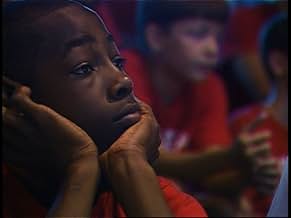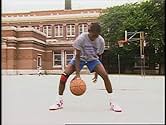A film following the lives of two inner-city Chicago boys who struggle to become college basketball players on the road to going professional.A film following the lives of two inner-city Chicago boys who struggle to become college basketball players on the road to going professional.A film following the lives of two inner-city Chicago boys who struggle to become college basketball players on the road to going professional.
- Nominated for 1 Oscar
- 23 wins & 9 nominations total
Marlyn Hopewell
- Self - High School Guidance Counselor
- (as Sister Marlyn Hopewell)
Featured reviews
It runs for three hours but it feels much less, such is the power that this documentary holds. Absorbing, you get sucked in and the film has this grip on you.
If Reality TV is your thing, I'd seriously give this film a go, then you can stop watching Reality TV and start to recognise, understand and prioritise real-world situations that actually matter, like racism, poverty, drug abuse, peer pressure and well, dreams.
You'll fall in love with the characters, and there's even a bad-guy for us to boo. You can sometimes question the manipulative techniques on display, but the film is actually not as guilty as some, the makers have a genuine affection for their subjects and do as much as they can within the rules of documentary to help them out without compromising their objectivity.
Be that as it may, this film should be compulsory viewing for many younger audiences, as it shows you exactly how real life differs from the garbage that passes for representation of youth on TV and in film today.
I really can't say enough about the need for more films like this, the fact that the Academy Awards were changed because of the strength of this film goes some way to showing you exactly how powerful it is.
If Reality TV is your thing, I'd seriously give this film a go, then you can stop watching Reality TV and start to recognise, understand and prioritise real-world situations that actually matter, like racism, poverty, drug abuse, peer pressure and well, dreams.
You'll fall in love with the characters, and there's even a bad-guy for us to boo. You can sometimes question the manipulative techniques on display, but the film is actually not as guilty as some, the makers have a genuine affection for their subjects and do as much as they can within the rules of documentary to help them out without compromising their objectivity.
Be that as it may, this film should be compulsory viewing for many younger audiences, as it shows you exactly how real life differs from the garbage that passes for representation of youth on TV and in film today.
I really can't say enough about the need for more films like this, the fact that the Academy Awards were changed because of the strength of this film goes some way to showing you exactly how powerful it is.
"Basketball is a ticket out of ghetto." (William Gates)
"... nobody cares about you. You're a black, you're a young male... The only reason why you're here [Nike training camp] is so you can make their team win. And if the team wins these schools get a lot of money." (Spike Lee)
These phrases, which have persisted as common knowledge among the African-American community during last several decades, have become familiar to the non-hyphenated Americans in the 90s, thanks to the films such as Boyz N the Hood and He Got Game. Among them, Hoop Dreams, a documentary that follows two black youths during a five-year period, is the most objective and the most quiet, but the most powerful statement to represent the disadvantaged youth in urban America.
The film reveals the pattern they follow. Being deluded by the luxurious surface of pro sports, they neglect education and then ending up going nowhere. The community suffers the vicious cycle and their feelings that the system exploits them remain.
Kudos to the filmmakers for their insane amount of work. They must have gone through numerous negotiations to attend and film various scenes, such as family's private events, classrooms, academic counseling, recruiting sessions with college coaches, and surgery operation rooms.
"... nobody cares about you. You're a black, you're a young male... The only reason why you're here [Nike training camp] is so you can make their team win. And if the team wins these schools get a lot of money." (Spike Lee)
These phrases, which have persisted as common knowledge among the African-American community during last several decades, have become familiar to the non-hyphenated Americans in the 90s, thanks to the films such as Boyz N the Hood and He Got Game. Among them, Hoop Dreams, a documentary that follows two black youths during a five-year period, is the most objective and the most quiet, but the most powerful statement to represent the disadvantaged youth in urban America.
The film reveals the pattern they follow. Being deluded by the luxurious surface of pro sports, they neglect education and then ending up going nowhere. The community suffers the vicious cycle and their feelings that the system exploits them remain.
Kudos to the filmmakers for their insane amount of work. They must have gone through numerous negotiations to attend and film various scenes, such as family's private events, classrooms, academic counseling, recruiting sessions with college coaches, and surgery operation rooms.
I'll never understand the USA's obsession with high school sports. Putting this much pressure on 14-18 year old kids and calling them athletes and referring to their basketball as a 'career' is harmful. Sure, it's an entertaining game but that's all it is. Once business takes over all bets are off and lives are ruined. The promise of the American dream of wealth and success is nothing but a bald-faced lie. These topics were briefly touched on but for the most part the movie was a rather passive documentary that simply chronicled two different boys' lives in high school basketball for four years. That in itself was interesting enough for me to give this movie a good rating. The people are compelling and it was good to know that eventually at least one of the boys came to realize that his NBA dreams were unrealistic. The movie still presents a powerful portrayal of the lower-class inner city blacks in America and the desperation they have to endure. One of the only outs for their kids seems to be sports scholarships. Enter the over-zealous coach, competitive scouts and legions of fans. It's interesting to see because no one in Canada is as obsessed with high school sports. I think it's mainly because it's the only way out for poor, inner-city blacks in America. The concept makes for an entertaining, emotional documentary.
10Agent10
This film simply exemplifies the reason why I hate most Oscar voters. This movie didn't even get a nomination, and it was one of the most successful documentaries ever! This especially exhibits the encroachment of coaches, family and other parties when it comes to the well being of inner city kids, who just happen to be good basketball players. Considering the state of pro basketball now, this kind of shows how the downward cycle of basketball was seeking lower standards. Sometimes funny, often times sad and poignant, this film is easily one of the best documentaries of all time.
"Hoop Dreams" brilliantly follows multiple parallel stories, bringing the viewer into the lives of two families of inner-city kids looking for a chance at the "big time", their ticket out of the ghetto. Although the main focus is on William Gates and Arthur Agee, their "supporting cast" is equally enthralling. From William's jaded brother Curtis, sublimating his own basketball aspirations to the reality of his blue-collar mailroom job, to Arthur's indomitable mom Sheila, doing the impossible every day as she keeps her troubled family together, there are a thousand reasons to cheer, laugh, cry, and rage packed throughout this amazing, inspirational, cautionary documentary.
By examining not only the players but also their families and environments, we are given a clearer view of their aspirations and motivations, what they plan to achieve and what they wish to avoid.
I will not summarize or elaborate further. If you have not seen this movie, put it on the short list. 9/10.
By examining not only the players but also their families and environments, we are given a clearer view of their aspirations and motivations, what they plan to achieve and what they wish to avoid.
I will not summarize or elaborate further. If you have not seen this movie, put it on the short list. 9/10.
Did you know
- TriviaAccording to Roger Ebert, after the film failed to receive an Oscar nomination for Best Documentary, he and Gene Siskel learned about the nominating process. He said that members of the Academy's documentary committee held flashlights when they watched documentaries, and anyone who had "given up" could wave it against the screen. The movie was turned off if a majority waved their flashlights. This film was turned off after 15 minutes.
- Quotes
William Gates: That's why when somebody say, "when you get to the NBA, don't forget about me", and that stuff. Well, I should've said to them, "if I don't make it, don't you forget about me."
- Crazy creditsThanks to the St. Joseph High School community and Coach Gene Pingatore who agreed to participate in a not for profit Kartemquin Educational film telling William and Arthur's stories. Today, St. Joseph, with a 39% minority enrollment, remains committed to the dream of a better life for all. Awarding need based financial aid to 40% of its students, St. Joseph with limited resources continues to maintain its academic excellence. A Hoop Dreams Fund has been set up to provide academic scholarships.
- SoundtracksIn This Very Room
Words & Music by Ron & Carol Harris
© 1979 Ron Harris Music (ASCAP)
All Rights Reserved.
All Rights Reserved. International Copyright Secured. Used by Permission.
- How long is Hoop Dreams?Powered by Alexa
Details
Box office
- Budget
- $700,000 (estimated)
- Gross US & Canada
- $7,830,611
- Opening weekend US & Canada
- $18,396
- Oct 16, 1994
- Gross worldwide
- $11,830,611
- Runtime2 hours 50 minutes
- Color
- Sound mix
Contribute to this page
Suggest an edit or add missing content





